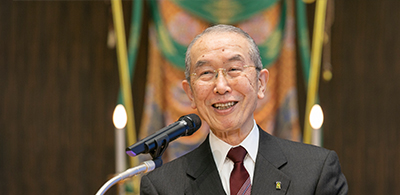Making a Mental Habit of Being Considerate of Others
February 2019

Desire Brings Forth Virtue
When you see someone in a public place who is having some difficulty, what do you do? I think many of you would approach the person and try to talk to him or her, but some of you, while concerned about that person, might wonder if your concern is a nuisance and hesitate to approach.
While this may be an overgeneralization, we usually make decisions by weighing the advantages and disadvantages of things, and we tend to react negatively toward that which may not benefit us. It is difficult for people to overcome their calculating minds.
Many of us may be concerned that talking to complete strangers might get us involved in their troubles. Some of you may, understandably, believe that doing so would not bring even an ounce of benefit.
But practices performed out of consideration for other people—even when we think they won’t offer us anything—do benefit those who perform them, as they help us develop as human beings and attain noble minds. In this sense, we could say that the desire to help others and thereby develop as a human being brings forth virtue.
However, even if we understand this, when we see someone having difficulty and we want to help that person, some of us cannot pluck up the courage to make the first move and take action.
There is a passage in the Sutra of Innumerable Meanings (chapter two, “Expounding the Dharma”) that says that “bodhisattva-mahasattvas are moved to heartfelt sympathy, give rise to great compassion, and want to relieve the suffering of living beings. Then they profoundly fathom all things.” This teaches us that bodhisattvas look with compassion and empathy upon the people before them, raise their consideration for them, and resolve to liberate them from suffering. In order to do this, they must remove themselves from the delusions and attachments of their own self-centeredness and be diligent in their effort to perceive the reality of things.
In other words, even we who have difficulty casting off our calculating minds can, through diligent effort, overcome our attachment to self-interest. When this becomes a mental habit, we will—in any situation and without weighing the advantages and disadvantages to ourselves—be able to naturally express our consideration for other people through our actions.
Everything Is One
“The falling snow / Must make her say, / ‘I’m cold, / I feel a chill.’ / So the mother goes / To place an umbrella / Over her dead child’s grave.”
This poem skillfully conveys the heartrending grief that a mother feels for the child she has lost. I feel it is teaching me that a bodhisattva’s feelings of consideration for other people are just like this mother’s.
This mother goes on living, always at one in body and soul with her child. She can hear her child’s voice crying, “I’m cold, I feel a chill,” and as these thoughts well up in her mind, she obediently moves to act upon them. Surely I am not the only one who sees, in her actions, the compassion of a bodhisattva.
Removing yourself from the delusions and attachments of your own self-centeredness and being diligent in your effort to perceive the reality of things means seeing that yourself and others are one and the same, just as this mother does. Moreover, when we see that everything is one, we understand other people’s joys and sorrows, our empathy and compassion are stimulated, and our consideration for others moves into action. By adopting the perspective that “everything is one,” consideration for others becomes a mental habit.
I recall a time when I visited the birthplace of Founder Niwano in Tokamachi, Niigata Prefecture. Rain was beating down upon a bust of Founder Niwano that had been erected in the park, so I held an umbrella over my father. I also intend to make an even more diligent effort to become a person who can naturally act with consideration in any situation and for anyone.
Of course, as Zen master Shido Bunan (1603–76) teaches us, “When you act compassionately without knowing that you are being compassionate, you are a buddha.” Becoming one with other people, being unaware that you are acting compassionately—such consideration brings joy and cultivates the minds of others and yourself.
Back Number



